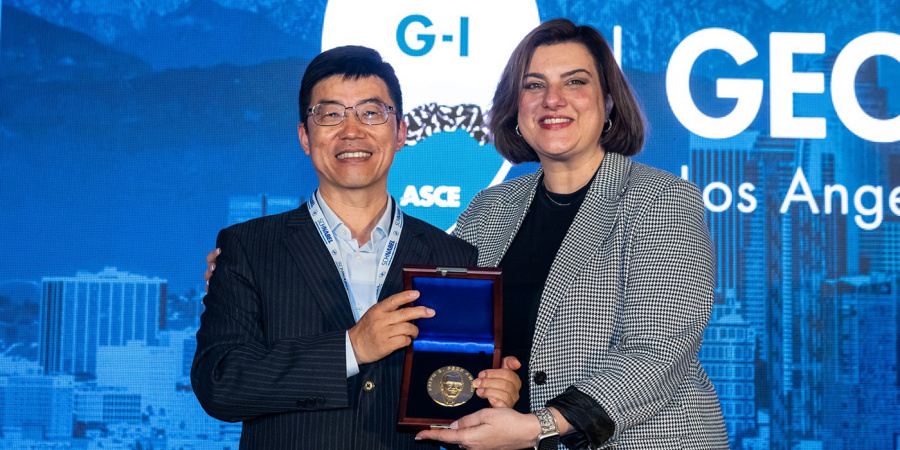Prof. ZHANG Limin Named 2023 Winner of ASCE Ralph B. Peck Award
Prof. ZHANG Limin, Head and Chair Professor of Civil and Environmental Engineering and Director of Geotechnical Centrifuge Facility, has been honored with the prestigious Ralph B. Peck Award 2023 by the American Society of Civil Engineers (ASCE). Hailed as one of the top international accolades in the geotechnical engineering area, the Ralph B. Peck Award marks the culmination of years of dedicated hard work and research excellence as well as an important milestone of Prof. Zhang’s professional career.
Prof. Zhang is recognized by ASCE for his outstanding contributions in developing methodologies for multi-risk assessment, risk-based engineering design, and emergency management as well as the publication of significant case histories. He received the award at the ASCE Geo-Congress, which was held in Los Angeles, California on March 26-29, 2023. He also delivered an award lecture in the topic of “Risk-Informed Decision in Geotechnical Design” during the congress.
The Ralph B. Peck Award is presented for outstanding contributions to the geotechnical engineering profession through the publication of a thoughtful, carefully researched case history or histories, or the publication of recommended practices or design methodologies based on the evaluation of case histories. Established in 1999, the award is given annually to one honoree.
Prof. Zhang’s published case histories range across various geotechnical applications. Among the most notable are his seminal contributions regarding the earthquake-induced landslide hazard chains, founded in his extensive studies of case histories such as those formed in the 2008 Wenchuan earthquake and the 2014 Ludian earthquake. His work on landslide risk assessment and mitigation, as cited by ASCE, has embodied the observational approach and philosophy put forward by the award’s namesake, Ralph Peck.
Over the years, Prof. Zhang has worked on topics ranging from foundations to slope safety, landslide risk management to climate change related adaptations. He credits his strong, steadfast desire to contribute to society and improve the living standards of citizens as the drive behind his research pursuits – a goal that embodies the meaning of his Chinese name “利民”, which is “benefiting the community” in English.
A forward-looking leader, Prof. Zhang sees engineering as “not just about resolving existing problems and making improvements on the status quo, but more importantly is about foreseeing and solving future problems”.
Back then as a researcher on a project to restore Wenchuan in Sichuan Province after the horrendous 2008 earthquake, Prof. Zhang called the experience one of the most unprecedented and impressive but also the biggest challenge of his career. The experience gave him profound insight on “the need to not just learn from the past but also predict the future” – which has also become the greatest motivation for his research.
“We should not just focus on resolving engineering and technical complications. We should put focus on realizing what social impact our work today will have on people’s livelihoods and the local economies, as well as how it will influence future engineering projects and practices,” he said.
To up-and-coming engineers, he encouraged them to choose a specialization that interests them and that they are passionate about, and keep up the passion and persevere. “Become an expert in your field, but, all the while, remember that it is important to remain open-minded and receptive to new engineering practices and knowledge,” he advised.
Related link:
- Department news (Feb 6, 2023): Prof. Limin Zhang Wins Ralph B. Peck Award
- ASCE news (Feb 24, 2023): Zhang honored with 2023 Ralph B. Peck Award
- 2022-2023 ASCE Geo-Institute awards video

